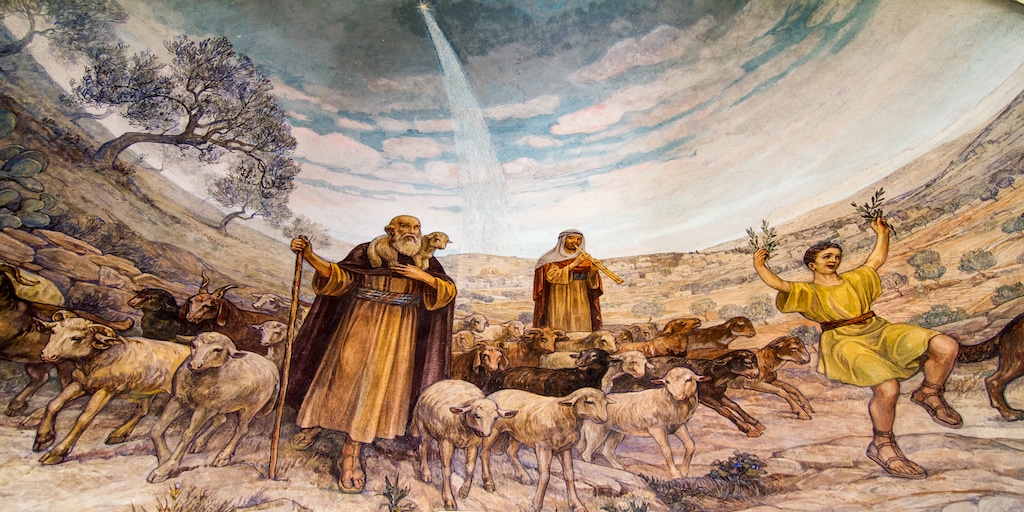Wonderful Counselor

Christmas is a season of awe.
It’s a time when we celebrate God’s extravagant display of grace, humility, and wisdom that runs contrary to conventional thinking: the King of Kings coming to dwell with commoners, the Most Holy meeting us in the mundane, Majesty cloaked in meekness, the All-Sovereign swaddled as a helpless newborn.
This surprising symbol of God coming as a child was long foretold by the prophet Isaiah.
One of the key sections where we find this is in Isaiah 9. It foretells the coming of a Child-King whose arrival will bring about the dawn of a new day (v. 2): a time when gladness will replace gloom (v.1); honor will be given to the disgraced (v. 1); abundance will fill what was desolate (v. 3); freedom will come to the oppressed (v. 4); and peace will conquer war (v. 5).
Isaiah tells us that all this will come not through symbols of strength and power, but through the birth of a child, the giving of a son (v. 6).
It will not be manufactured or produced by human effort. It will not be attained by a deserving people. It will be a “gift” (v. 6) to “a people walking in darkness” (v. 2).
Isaiah, goes on to describe the nature of this Child-King through a series of four names, the first of which is “Wonderful Counselor.”
Counselor
Interestingly, this child’s first description is one typically associated with the elderly, not a child. The term “counselor” (Hebrew: yaats) involves both devising and advising, planning and guiding. It is done with wisdom and purpose as it aims to bring about what is best.
Throughout Scripture, God’s counsel is spoken of as an expression of His love.
“I will instruct you and teach you in the way you should go;
I will counsel you with my loving eye on you” (Psalm 32:8 NIV).
We also see numerous examples in Scripture where God’s wisdom is counterintuitive to the ways of this world. As Paul puts it,
“God has chosen the foolish things of the world to shame the wise, and God has chosen the weak things of the world to shame the things which are strong . . . so that no human may boast before God.” (1 Corinthians 1:27-29, NASB).
“For the foolishness of God is wiser than human wisdom, and the weakness of God is stronger than human strength” (1 Corinthians 1:25, NIV).
This theme plays a prominent role throughout Isaiah where the wisdom and military might of foreign nations is torn down (the object of King Ahaz’s misguided trust – Isaiah 7-8). In contrast, God, who sits enthroned above the earth, delivers His people through images of weakness (like a child, a suffering servant, etc.).
The early church father, Augustine, makes the interesting observation that, like any good doctor, God treats the nature of our wounds and brokenness with their corresponding remedy. He writes,
“Seeing, then, that man fell through pride, [God] restored him through humility. We were ensnared by the wisdom of the serpent: we are set free by the foolishness of God. Moreover, just as the former was called wisdom, but was in reality the folly of those who despised God, so the latter is called foolishness, but is true wisdom in those who overcome the devil.”[1]
To a world entangled in pride, God points to this Child-King as the greatest source of wisdom and guidance. We should not be surprised if He leads us in ways that seem counterintuitive to the pomp and pursuits of this world.
Wonderful
This Child-Counselor will not only be a wise counselor; He is described as being a “Wonderful” Counselor. The Hebrew word for wonderful (pele) is a little different than how we typically use the English word today. Rather than depicting something as delightful or pleasant, it describes something that is astonishing, miraculous, beyond expectation and explanation. It is something that leaves a person in wonder.
The first time we encounter this word is in Exodus 15. It is used by Moses and the Israelites as they burst into song after God rescued them from slavery in Egypt by parting the Red Sea and destroying their oppressors. Reflecting on God’s miraculous deeds, they sing,
“Who among the gods
is like you, Lord?
Who is like you—
majestic in holiness,
awesome in glory,
working wonders [pele]?” (Exodus 15:11, NASB).
As we see here, this is a term that is only used to describe God, most commonly His deeds and instruction. Throughout Scripture, this term is never used of humans, not even great leaders like Moses who served as God’s instrument in performing many of these miracles. It is attributed exclusively to the LORD. It recalls something of which no other human or so called “god” is capable.
Thus, to find it part of this title intimates that this Child-King must be more than merely human. Somehow, He must also be God Himself. This conclusion is further supported by the additional names given to Him: “Mighty God, Everlasting Father, Prince of Peace.” In this child we find the ultimate display of Immanuel, God with us.
Following this divine Child-King will leave us in awe. What may look like foolishness to the world will be met with God’s miraculous intervention.
Furthermore, the Child’s guidance will be supernatural not only in miraculously shaping the circumstances around us, but also in transforming our hearts so that we can finally follow Him in the way of life. After noting this, some have paraphrased Wonderful Counselor as “supernatural heart changer.”[2] He gives us not only wise instruction but also a new heart that takes joy in following it.
Personal Reflection
So what might it look like for you this Christmas to celebrate Jesus as your Wonderful Counselor? Do you delight in His promptings and instruction? Do you trust Him even when it seems foolish to those around you? Maybe you want to reflect on a time when you stepped out in faith and saw Jesus do something that left you in awe. Is there anything you need Him to supernaturally intervene with this season or transform in your own heart? What a gift it is to have such a Wonderful Counselor!
Go Deeper
-
Augustine, On Christian Doctrine, Book I, Chapter 14. You can read this at https://www.newadvent.org/fathers/12021.htm . ↑








